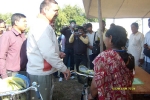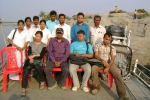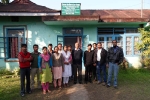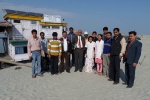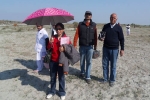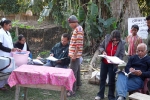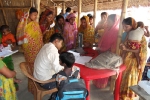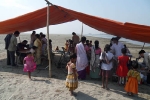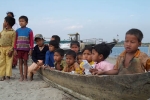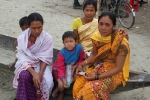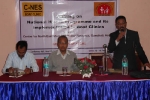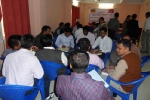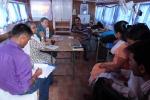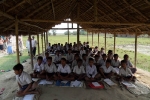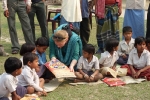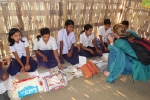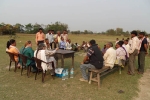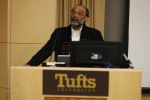By the Brahmaputra (Vol:9) Jan-Mar 2010
C-NES Newsletter
(For the quarter Jan – Mar 2010)
Editorial
The Dalai Lama speaks – compassion, humour and discipline
 The Banquet Hall of the Ashok Hotel, once the Government of India’s flagship property where great international conferences were held and heads of state stayed and were feted at banquets, had been converted into a shimmering temple of orange and ochre, its floor emptied of tables and instead covered with mattresses covered with white sheets and rich red bolsters. Chairs were placed along the sides and at the back to enable those who preferred, to sit.
The Banquet Hall of the Ashok Hotel, once the Government of India’s flagship property where great international conferences were held and heads of state stayed and were feted at banquets, had been converted into a shimmering temple of orange and ochre, its floor emptied of tables and instead covered with mattresses covered with white sheets and rich red bolsters. Chairs were placed along the sides and at the back to enable those who preferred, to sit.
On the stage was a small wooden throne where the monk, Tenzing Gyatso, wearing dark glasses and wrapped in a robe surveyed the listeners benignly. Portraits of Avalokiteswara, a Bodhisatva , and of the Buddha were painted onto cloth at the back and there were low tables full of little figurines of the Buddha and other deities as well as lamps with rotating images of Om Padme Mane Hum in the Tibetan script.
In the background, gentle, sonorous Tibetan chants played and the aroma of the sharp incense that Tibetan monasteries are known for filled the air. It was incredibly peaceful and I walked in, to take part in three half days of the Dalai Lama’s teachings, and met a few old friends and colleagues like Sudip Mazumdar, one-time Newsweek reporter who now lives is splendid isolation in the hills.
Those who attended the teachings include many dedicated Buddhists or followers of the Dalai Lama; I have been interested for long but have not been able to attend his discourses. This time, at the encouragement of a close friend, I made it a priority. I’ve interviewed him in the past in Dharamsala, traveled in Tibet and am sympathetic to the Tibetan struggle against Chinese control. To me, the monk hood in Tibet – as in Burma, also under a repressive regime –is a symbol of the sustaining power of Buddhism as well as continuing presence of the Dalai Lama, even after his flight to India in 1959. He has been in India for over half a century but his belief in Indian democracy, despite its many shortcomings, despite New Delhi political ambivalence and failure to bluntly confront the Chinese on the Tibetan issue many times, remains unchanged.
To those who complained about the failings in Indian democracy, he always had had a clear answer: look at an authoritarian regime such as China, where the basic freedoms do not exist, and you will understand how important India’s democracy is to its people and to the world.
Rubbing his forehead, occasionally sneezing and chortling as the sneeze, magnified by the mouthpiece he was wearing, startling some, the Dalai Lama reflected on the need for mental calm, on suffering, compassion, introspection, forgiveness, tolerance and cognition.
Throughout those days, I kept thinking of the amazing privilege of our participation – when six million of his deeply religious countrymen, to whom he is a reincarnation of Avalokiteshwara, are deprived of a glimpse of his physical presence not to speak of that energetic voice. Yet, he remains an enduring symbol of their hopes.
From my travels in Tibet as well as interactions with Chinese scholars and former government officials, including diplomats, it is clear that Beijing does not understand or even begin to counter his spiritual and moral influence despite his physical absence. It angers them but they don’t know how to deal with it, despite their troops and heavy
weaponry, the migration they have encouraged, the “development” andinfrastructure they have built. Tibetan loyalty, it appears, is not for sale.The Chinese were furious this year when the Dalai Lama announced that Tawang in Arunachal Pradesh, assiduously sought by the Chinese in the border negotiations, was very much part of India, a statement he had not met before, and New Delhi rejoiced in Chinese discomfiture. He made the statement in Tawang itself and when I asked about it during a brief break in the discourses, he remarked: “But that is the correct position.”
China needs to seriously dialogue with the Dalai Lama’s negotiators to find a middle ground instead of playing a waiting game, hoping that he will vanish from the scene and people will lose faith and interest. Real-time negotiations would reflect the mind of a mature nation and not a near Super Power that is, at its core, even 51 years down the
road, unsure of its hold, acquired through stealth and military might, on the Tibetan people and afraid of a man without an army, armed with spiritual knowledge, the love of his people and the support of much of the world. And that is why India must, without deviation or demur, respect and back the Dalai Lama.
Sanjoy Hazarika
Managing Trustee
Highlights of the C-NES-NRHM Boat Clinic Public Private Partnership
Boat Clinic under NRHM- Activity Report (Apr 2009 till FEB 2010)
|
Districts |
Health Checkup |
RI |
ANC |
PNC |
Vit A |
Spl. Vaccination |
IPPIP |
Delivery |
Total |
Family Planning |
|
Tinsukia |
11837 |
466 |
249 |
18 |
5 |
0 |
0 |
0 |
12575 |
1314 |
|
Dhemaji |
10770 |
638 |
495 |
66 |
96 |
0 |
0 |
0 |
12065 |
12 |
|
Dibrugarh |
8124 |
912 |
250 |
23 |
456 |
0 |
573 |
0 |
10338 |
942 |
|
Morigaon |
16898 |
2410 |
1126 |
380 |
648 |
0 |
188 |
0 |
21650 |
552 |
|
Dhubri |
21365 |
2889 |
485 |
69 |
73 |
0 |
0 |
0 |
24881 |
1271 |
|
Lakhimpur |
14244 |
968 |
330 |
106 |
259 |
0 |
0 |
0 |
15907 |
527 |
|
Jorhat |
7712 |
292 |
223 |
41 |
159 |
0 |
0 |
0 |
8427 |
540 |
|
Sonitpur |
12366 |
2911 |
731 |
102 |
1848 |
1317 |
911 |
0 |
20198 |
3016 |
|
Nalbari |
15809 |
3482 |
688 |
91 |
248 |
0 |
0 |
0 |
20318 |
2235 |
|
Barpeta |
11187 |
3779 |
955 |
207 |
1178 |
0 |
0 |
0 |
17306 |
1731 |
|
|
|
|
|
|
|
|
|
|
|
|
|
Total |
130312 |
18747 |
5532 |
1103 |
4970 |
1317 |
1672 |
0 |
163665 |
12140 |
From the Boat Clinics
C-NES Trustee visits Boat Clinics
Mr Chaman Lal, C-NES Trustee and former Special Rapporteur at the National Human Rights Commission, also former DGP, Nagaland, was on a visit to review the functioning of the Boat Clinics in December 2009. The review follows the broad objectives of the programme spelt out in the MOU signed by C-NES with NRHM.
Mr Lal was on a similar visit in May 2009 where he visited seven of the ten districts where the boat clinic health initiative has been operating in partnership with NRHM. The Trustee visited all 10 districts to assess the performance of the C-NES units on the ground and take stock of their constraints and difficulties. He interacted at length with the boat clinic staff, local community members, district authorities and NRHM officials including Dr. J. B. Ekka, Mission Director, NRHM at Guwahati. Mr Lal stressed on the need for special attention to the quality aspect of services, ensuring cent percent coverage of Ante and Post Natal Check ups and full immunizations.
Training on National Health Programmes:
A training for Boat Clinic staff was organized in association with NRHM in February 2010 at Guwahati. The objective of the program was to highlight the National Health Programs with special emphasis on Maternal and Child Health, the main focus of the Boat Clinic health camps. The participants included 16 doctors, 10 District Program Officers (DPO), the Program Management Unit of C-NES from Guwahati and guest invitees. Resource persons included Dr. P.N.Bora, SPM, Dr.C.R.Hira, Consultant, Maternal Health, Dr.A.C.Sarma,Consultant Child Health, S.Borthakur, BCC expert, and Dr.Sandip Ghosh from NRHM, Dr. S.Bora, TB/HIV coordinator, Dr.K. Barman, Malaria consultant of RNTCP and C-NES Trustee, Dr.Mahfuza Rahman.
Dr PN Bora spoke on NRHM, its programs and application to the Boat Clinics. Child Health and preparation of Micro Plan for Routine Immunisation was explained by Dr.A.C.Sarma. Disease control with a focus on TB and how the program can be taken to the island population was informed by Dr.Simanta Bora. National Vector Borne Disease Control program with focus on Malaria and Japanese encephalitis in Assam with the areas where the disease in mainly prevalent was discussed by Dr.Barman
Dr.C.R.Hira discussed Maternal Health with emphasis to Assam which has the highest MMR in the country. Family planning issues and its implementation in boat clinic was highlighted and discussed by Dr.P.N.Bora. Mrs.S.Borthakur dealt with the tools of IEC and steps for Behavioral Change Communication (BCC) in generating awareness among the targeted population. All the sessions were interactive where participants related their field experiences to the resource persons.
Intern from TISS
The Boat Clinic initiative has provided opportunities to students doing research on delivery of primary healthcare and education to the islands on the Brahmaputra. Dr Sheila Longkumer , a Post Graduate student in Disaster Management at the Jamsetji Tata Centre for Disaster Management of Tata Institute of Social Science (TISS), Mumbai conducted her internship program with C-NES in the boat clinics on “ Bridging the Gap – Health care Access in the Brahmaputra river islands through Boat Clinic: Issues and Challenges”. Dr. Longkumer had come as part of a new collaboration between TISS , one of India’s foremost research centres for social science and C-NES.
In 2008, four Interns from KCCI summer internship program sponsored by UNICEF conducted a two-month case study. Research studies were also conducted by two students from Tufts University, US, from the Institute of Global Leadership in the same year.
Pulse Polio Program at Sarikholia sapori
The Dibrugarh Boat Clinic organized special camps (10 – 13 January 2010) during a Pulse Polio Immunization campaign. The Deputy Commissioner of the District, Mr. GD Tripathy visited Sarikholia sapori and launched the program. He was accompanied by Dr. P C Hazarika, Joint Director of Health Services, Dr. Bhobojyoti Borah, Surveillance Medical Officer, World Health Organization and the Boat Clinic health team. A public meeting was held at the sapori where the Deputy Commissioner met PRI members, teachers, ASHAs, AWWs and the villagers who got a rare opportunity to share their problems with the Deputy Commissioner. The villagers felicitated the health team. According to Dindayal Yadav, the headman of the isolated river island, “I cannot believe that the DC, the head of the district is in our midst” Expressing gratitude to the Boat Clinic team and the health service provided, the villagers said that this was the only service they got in their remote homes. Bicycles were distributed to the ASHAs of the islands as part of the programme.
The Deputy Commissioner on his part assured the villagers of all support and said that he had come “not to speak but to listen”. The official lauded the activities of the Boat Clinic and expressed keenness to upscale the Boat Clinic health service in the district.
PFI Training
Population Foundation of India (PFI) and C-NES have been working together for a project “Mobilizing the unreached” towards Family Planning, Reproductive Child Health (RCH) and Awareness building thereof from November 2009. The family planning intervention includes developing a programme for family planning in five districts of Upper Assam- Dibrugarh, Dhemaji, Tinsukia, North Lakhimpur and Sonitpur and promotion of modern methods of contraceptives. This three-year project will support the outreach achieved through an ongoing partnership of the innovative boat clinics with the National Rural Health Mission, Government of Assam, by focusing on propagating family planning methods. A set of documentary films on the boat clinics is also being shot as a part of the project.
Orientation on family planning
A four day training on interpersonal communication skills, counseling and family planning was held as part of the PFI project at the State Institute of Health and Family Welfare Khanapara, Guwahati in January 2010. The training was attended by the Programme Management Unit of C-NES, DPO’s and Family Planning Counselors from the five districts where the project is being implemented . The resource persons for the training were Dr Sharmila Neogi, Joint Director, Sona, Programme Manager BCC, Chandni Malik and Mridu Pandey Programme Associates from PFI, New Delhi. Training and discussions were held on Reproductive and Child Health, Maternal Health, the human anatomy, BCC activities, IPC skills and advocacy with community and the government. Related questionnaires were distributed to the participants and a feedback session organized.
Exposure Visit for CRS team
Popularly described as a “radio for the people, of the people and by the people”, Community Radio (CR) is a new concept in India- for both the community and the development agencies. It has democratized mass media the world over. Issues like communal harmony, disaster management, food security, cultures, traditions, health/ hygiene, education, gender issues and livelihoods can be addressed through CR. These issues would have significant relevance for C-NES and the organization’s upcoming UNICEF supported CR station at Maijan Ghat Dibrugarh. The geographical coverage of the station will be unique as it will be covering the river islands of the Brahmaputra, catering to marginalized communities living in these islands as well as the tea tribe community residing nearby.
A visit to Lalit Lok Vaani, CRS, Lalitpur in Uttar Pradesh was undertaken by the C-NES team comprising Manik Boruah, Assistant Programme Manager, Bhaskar Jyoti Bhuyan, Coordinator, CRS and Ramakant Yadav, Community Worker to see how the station operates including holding stake holders meeting, formation of listeners group / CRS management committee, staff selection, training, orientation and making issue based programmes. The visit will help the team formulate future plans and programmes for the CRS.
Team at regional conference
Bhaskar Jyoti Bhuyan and Manik Boruah also participated in the regional conference on Community Radio, organized by the World Association of Community Radio Broadcasters (AMARC) in Bangalore from 20-23 February, 2010. Representatives from all over the world participated in the conference. The team got valuable inputs on running a CRS station from the experienced participants present at the conference C- NES is expected to get membership of All India CRS Forum within this year (2010) and a subsequent membership of AMARC Asia Pacific the following year (2011).
Sanjoy Hazarika is Consulting Editor, Sunday Guardian
Sanjoy Hazarika, Managing Trustee, C-NES has become Consulting Editor for The Sunday Guardian. This new Sunday newspaper is published from Delhi under the leadership of the veteran editor and author M J Akbar. Mr Hazarika would also be responsible for stories from the North East. His popular column, North by North east, which touches upon his reflections on the realities and challenges of the North-east as well as its lighter side, will return to readers through the publication.
|
Delivery at Barpeta health camp
At a health camp at Barpeta’s Rampara char, an emergency delivery was conducted. Anjuwara Khatun was registered for her ANC check up in an earlier camp here. The delivery was conducted by Dr.Tawazuddin Ahmed, MO of Barpeta Boat clinic assisted by ANM, Amela Khatun also of the Boat clinic. JSY and Majoni were also availed of from the Mandia Block PHC. Assam has the highest MMR’s in the country (480 per 100,000 live births). The Boat Clinic health teams stress on the need for institutional delivery to pregnant women who attend the camps for their ANC check ups. Sustained health care through Boat clinics to excluded people on islands of the Brahmaputra river, Assam have reached nearly 3,00,000 of the poor with a focus on reducing maternal and infant mortality rates in partnership with the National Rural Health Mission (NRHM) and UNICEF. |
Boat Clinics in Republic Day Tableau
The Boat Clinics found a pride of place and displayed at the Republic Day Tableau in Nalbari and Lakhimpur by the respective District Health Societies, winning the first prize at Lakhimpur and the second at Nalbari. The model at Lakhimpur, designed by District Media Expert, Bijendra Gogoi, highlighted the need for family planning and institutional delivery including Govenment incentives for the same. The Republic Day function was held at Lakhimpur’s Commerce College Field where the Deputy Commissioner, Jayanta Narlikar hoisted the National Flag. At Nalbari the function was held at the Gordon field, where the State Revenue Minister, Dr Bhumidhar Burman hoisted the Tricolour in presence of the Deputy Commissioner, Ashutosh Agnihotri and other district officials. The event was covered in leading vernacular dailies of the state- Khabar, Amar Asom and Pratidin.
From the launch of the Boat Clinic in Dibrugarh in 2005 and its spread across Assam to 10 districts in 2009, most districts have reported support from villagers and government.
Sanjoy Hazarika presented ‘Global Citizenship’ award
Tufts University, one of the leading US universities, has awarded this year’s Dr Jean Mayer Award for Global Citizenship to Mr Sanjoy Hazarika for his advocacy of issues in India’s northeast to a national and international audience. The award, presented every year to scholars and practitioners who have made significant contributions to improving the lives of people in their areas of work and impacting both research and policy, also recognizes Hazarika’s innovative work and initiatives in health and governance in the area.
Previous recipients of the award have included Nobel Laureate’s economist Amartya Sen and South African freedom fighter Rev.Desmond Tutu. Hazarika, said in acceptance remarks that he appreciated the recognition that the award represented for the work of his team, research staff and the support of his family. “Without their cooperation and commitment, our work in the fields of health, environment, building bridges of understanding, research, policy change and governance would not have been possible,” he said.
| Eye check ups at Dhubri char
Ophthalmic Assistant Dr B. Deka and a team from the District Blindness Control Society, Dhubri was deputed to two camps organized by the Dhubri boat clinic at Namapara and Dangirchar Bagmara chars in December 2009. Nampara char, located downstream Dhubri ghat under Dharmasala PHC and Aironjongla gaon panchayat has a population of 1100. This was a regular monthly camp in this char. In the absence of ASHA, the community workers informed the villagers. The camp was conducted near the river bank and an awareness session of 45 minutes on routine immunization and family planning was conducted before the eye check up session. Dr Deka attended to patients with vision problems, screening and short listing patients with cataract and referred them for operation at the Civil Hospital, Dhubri. This will be a regular feature in the Dhubri health camps. |
UNICEF Official at Lowkiwali feeder school
C-NES has been implementing an education initiative with UNICEF support -that of up scaling education for school dropouts in the saporis of Dibrugarh and Lakhimpur districts.
In February 2011, Sara Poehlman, Education Specialist, UNICEF India accompanied by Deepa Das, Education Officer, UNICEF, Assam visited Dibrugarh to observe a feeder school set up by C-NES with UNICEF support. C-NES’ educational team led by Associate Programme Manager, Sanjay Sharma, Madhabi Lahon, newly appointed educational coordinator and Bhaskar Bhuyan, the Community Radio Station coordinator were present with the UNICEF team.
It took the group over four hours to reach the Lowkiwali Feeder School, travelling in a small country boat from Sarikholia, spending over two hours in the school. Poehlman met the children and interacted with them on a one to one basis. Madhabi Lahon and Bhaskar Bhuyan conducted a class in English for the students of class five. There was a brief presentation on C-NES’ education initiative by Sanjay Sharma on board boat clinic Shanaz showing the objectives, activities conducted, trends of enrollment, baseline surveys and the overall reduction in out of school children at the primary level after the C-NES- UNICEF intervention.
Lamenting that there were 8 million children out of school in India, Poehlman said that C-NES educational programme in Dibrugarh and Lakhimpur has made significant contributions in bringing out of school children back to mainstream education. A meeting with the villagers was organized where the UNICEF official said that she was “extremely satisfied” to see this community run school adding that she would request the concerned ministry to take up this model for upscalling and to replicate it in other districts.
Elementary education in the saporis of Dibrugarh and Lakhimpur after project intervention as on December 2009: an overall scenario.
|
Particulars |
Dibrugarh |
Lakhimpur |
Total |
|
Dropouts and never enrolled children in survey
|
82 |
277 |
335 |
|
Bridge course enrolment
|
46 |
142 |
188 |
|
Feeder school enrolment
|
245 |
156 |
401 |
|
Total enrollment in Bridge courses and feeder schools
|
291 |
298 |
589 |
|
Total enrollment in all schools in the saporis
|
748 |
1169 |
1917 |
Meetings and appointments of the Managing Trustee
|
2.1.10 |
Lunch meet with Mr. Raghav Pandey, Former Petroleum Secretary |
|
7.1.10 |
Lunch meet with Mr. Nandan Nilekani, Chairman, Unique Identification Authority Of India , New Delhi |
|
8.1.10 |
Attended book launch ‘The Hidden Land’ by Mamang Dai, noted author from Arunachal Pradesh. |
|
11.1.10 |
Attended Dinner Reception with Minister & Deputy Head of Mission in German Embassy. |
|
15-16.1.10 |
Participated in second international workshop on “Himalayan Sub-regional Cooperation for Water Security” and spoke on the issue “Ideas for cooperation in hydroelectricity and water based tradeb and transit” organized by Strategic Foresight Group, co-hosted by the Bangladesh Institute of Peace and Security Studies and supported by the prestigious MacArthur Foundation in Dhaka, Bangladesh. |
|
21.1.10 |
Attended Informal briefing followed by lunch organized by Institute of Peace And Conflict Studies for Mr Barry Lowenkron, Vice President McArthur Foundation on his visit to India on 21 January 2010 at Habitat Centre, New Delhi. |
|
22.1.10 |
Spoke at National Seminar on: “Illegal Immigration and Demographic Developments in India” organised by Patriots’ Forum at IIC Conference Room, New Delhi. |
|
3.2.10 |
Dinner on the occasion of the visit President of the Federal Republic of Germany Prof. Dr. Horst Kholer & Mrs. Eva Luise Kohler at Embassy of Federal Republic of Germany |
|
10 .2.10 |
Met Mr. Nandan Nilekani, Chairman, Unique Identification Authority Of India , New Delhi. |
|
15.2.10 |
Organized memorial meeting to honour & remember Dr. Biswajeet Saikia at Academy of Third World Studies, Jamia Millia Islamia. Biswajeet was a friend, fearless scholar and thinker who passed away suddenly from renal failure. |
|
16-20.3.10 |
Received the Dr. Jean Mayer Global Citizenship Award from Tufts University, participated in panels on ’South Asia’s Troubled Waters: Deluge and Disappearance’, ‘Violent Discontent: Addressing Regional Insurgencies’ and ‘The Future of Kashmir’ in 2010 EPIIC international symposium at Tufts University. He presented also the work of C-NES ‘ health initiative and separately led a breakout discussion group on water issues in South Asia where he screened his film, ‘Children of the River, the xihus of Assam’ on the endangered Gangetic river dolphins in the Brahmaputra. |
|
25-26.2.10 |
Attended National Seminar on Social Research in ‘North East India: Issues and Challenges’ Organized by North East India Studies Programme, at School of International Studies, Jawaharlal Nehru University, New Delhi |
|
26.2.10 |
Attended lecture of Professor Fakir Syed Aijazuddin, International Councilor of the Asia Society, New York on ‘Pakistan : Your Distant Neighbour’ at Ho Chi Minh Conference Hall, ATWS, Jamia Millia Islamia, New Delhi. |
|
16.3.10 |
Meeting with World Development Report 2011 drafting team and presented issues and concerns of the North-east and neighboring regions, World Bank Office, New Delhi. |
|
19.3.10 |
Participated Two days India Bangladesh dialogue by ORF jointly with Bangladesh Enterprise Institute |
|
20-21.3.10 |
Participated in Buddhist teachings by His Holiness The Dalai Lama, New Delhi. |
|
23.3.10 |
Organized the first Saifuddin Kitchelew Annual Lecture by the noted editor and author, Mr. M.J. Akbar on ‘Indian Muslims: Crisis, Confrontation and Challenges’ at Jamia Millia Islamia, New Delhi. |
|
25.3.10 |
Organized and Chaired one-day Seminar on ‘Assam and the role of Muslims in the Independence Movement’ Jamia Millia Islamia, New Delhi. |
|
27.3.10 |
Attended C-NES Board of Trustee meeting, New Delhi |
|
30.3.10 |
Attended National Disaster Management Authority’s Advisory Committee Meeting, New Delhi. |
